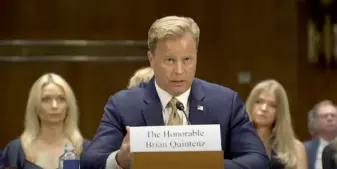Brain Quintenz, the Trump nominee to lead the Commodity Futures Trading Commission (CFTC) has said that tribes can get involved in sports prediction markets.
Speaking at a hearing in the U.S. Senate Committee on Agriculture, Nutrition, and Forestry on June 10, Quintenz answered a range of questions relating to the expansion of sports prediction markets.
Sen. Adam Schiff raised the concern of tribal leaders that the markets offered by Kalshi and other event contracts platforms equate to sports betting. Schiff commented, “If betting on the outcome of a sporting event looks like sports betting, looks like gaming, smells like gaming, sounds like gaming, there are winners and losers like gaming, it’s probably gaming.”
An Indian Gaming Association (IGA) spokesperson previously stated, “Trading of sports contracts is gaming, violates state and federal law and is contrary to public policy.”
Quintenz commented that tribal leaders can apply to the CFTC to offer the markets, as the Commodity Exchange Act (CEA) does not exclude tribes. Quintenz said, “Nothing in the CEA that I’m aware of prohibits or affects the opportunity of tribes to offer those products and those markets and those services.”
Quintenz open to engaging with multiple stakeholders
He also said he was willing to listen to concerns and plans to have a “very robust all-stakeholder engagement process”. Previous plans for a discussion about sports prediction markets were cancelled by CFTC acting chair Caroline Pham last month.
Quintenz said he is open to rescheduling the roundtable, “I have no information as to why it was canceled, and I’d be happy to reschedule it. Since I don’t have any plans to issue any guidance in the near term, so I feel comfortable making that commitment.”
As well as opposition from tribal leaders, state regulators and sports leagues have also criticized the continued expansion into election betting and sports wagering. Seven states issued cease-and-desist letters to Kalshi as well as some to Crypto.com and Robinhood, but so far the companies have scored victories in court. A judge in Nevada ruled in Kalshi’s favor last week, allowing the company to continue offering its markets there. Sports events now account for over 80% of the platform’s trading volume.
Elon Musk’s recent partnership with the prediction markets site Polymarket also has the potential to expand the reach of the markets, despite the platform being blocked in the US.
Quintenz paving the way for further expansion
Quintenz, a board member of Kalshi, showed no signs of slowing down the expansion of prediction markets. He commented, “I believe the law is very clear about the purpose of derivative contracts and about events that have financial or economic consequences qualifying as commodities.”
Kalshi has used the same argument in court, that their sports prediction markets have real-world financial consequences and are therefore valid under the CEA.
Quintenz added, “The agency would want to ensure that it is appropriately defending the Commodity Exchange Act and the remit that the agency has to regulate and preempt laws, state laws around futures and derivatives markets.”
If appointed as chair of the CFTC, Quintenz has vowed to give up his position at Kalshi, but his comments suggest he will still be looking out for the company in any legal battles it faces with state regulators. He was also an advisor for Crypto.com in the past, and other potential conflicts of interest arise in Donald Trump Jr. being an advisor to Kalshi.
Sen. Cory Booker raised concerns over the potential bias of Quintenz and Trump, stating, “I hope you can appreciate that there will be some real questions into your independence in that role, given the fact that you sat on the board of this. You can understand that there’d be concerns about that.”
“If [you are] chairman, are you going to feel empowered to prosecute a company or push back on a company that’s being advised by the president’s son? This deserves some exploration.”
The committee did not vote on Quintenz’s confirmation in the hearing, but if they do approve it, the issue would go to the full Senate for a vote.

